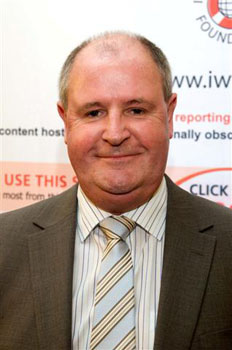This article is more than 1 year old
IWF chief: We don't need crusaders
El Reg speaks to URL-blocker boss Peter Robbins
Interview Peter Robbins, Chief Executive of the Internet Watch Foundation (IWF) comes across as a genial politician – and a through-and-through pragmatist. He is in no way the moralising, censorious villain that some of the internet’s more Libertarian anti-censorship lobby would make him out to be.
For all the bonhomie, there is a toughness there too: a sense that this is not a person to cross.
El Reg met with Peter Robbins about a week ago. The IWF is an organisation that features ever more prominently in the governance of the internet – even meriting a mention in the recent report on Digital Britain, as a model that UK plc thinks the rest of Europe should buy into. We were naturally interested in where their Chief Executive believes them to be heading.
At the same time, we wanted a better sense of the man behind the organisation. We sat down together in the somewhat spartan, antiseptic surroundings of a room in the IWF’s HQ in Oakington, just north of Cambridge. There is a calm about the place, an almost monastic quietness that is very different from other workplaces.
That may be the building – a renovated house, as opposed to purpose-built offices - or perhaps it is the nature of the work. Around 15 people are regularly on site, and some of them spend a fair proportion of every day grappling with the most horrendous images of torture and abuse imaginable. Piped music and everyday banter might be inappropriate.
Robbins’ record is solid. He joined the Metropolitan Police in 1971, retiring in 2002 as the Borough Commander for Hackney. During his service he worked in the Obscene Publications Branch at Scotland Yard. He also liaised regularly with Child Protection Units. Along the way, he picked up the Queen’s Police Medal, later receiving the OBE in 2008 in recognition of his services to child protection.

Peter Robbins
Did he have a special interest in Obscenity or Child Protection, we inquired, sensing an agenda? "No," was the simple answer. If anything he comes across as the quintessential police manager: proud of his achievements wherever he is working. A recurrent phrase throughout the interview is "team work": he is a man with a strong sense of traditional managerial responsibility. He likes to look after his own and, we suspect, looks for loyalty in return.
If there is an agenda – and we have no reason to think there is – it remains well hidden. He moved from post to post, aiming always toward the rank of Chief Superintendent – which he eventually achieved in Hackney. The placement with the Obscene Publications Unit was brief, and was back in the late 70s. His special area of interest, as he climbed up the promotion ladder was public order – and disorder.
His sense is that any sort of moral agenda would be wholly wrong for the IWF. "This is not an organisation that requires crusaders - anyone who is here to stamp stuff out is probably the wrong person," he states. "We need objective strong people who will stand by decisions - we need common sense."
That is a quality that Robbins returns to at various points throughout the interview. Why did the IWF recruit a senior policeman as opposed to a lawyer? He cites pragmatic reasons: "Police culture is different. The work of the IWF requires frequent liaison with police forces - an insider knowledge of how those forces work is useful."
